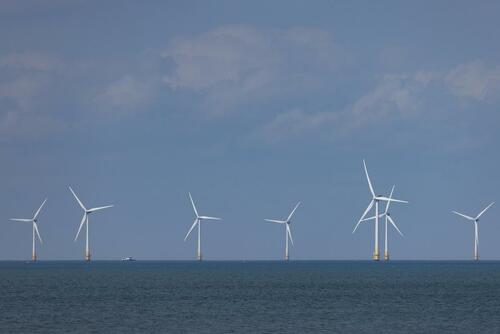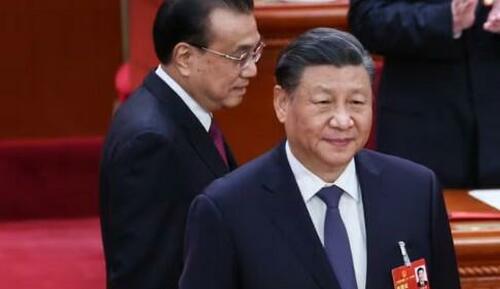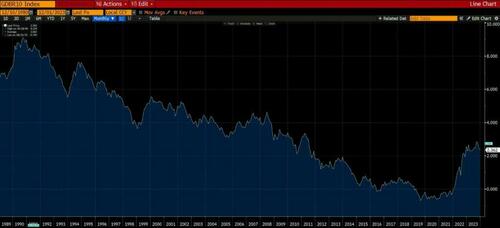Our modern society was built on oil. This is not by accident. Oil is the only energy source that is concentrated, easy to transport, use, and until recently cheap. Unfortunately oil is not forever. Our problem is not the lack of oil per se but that eventually it will take almost as much energy to pump it out of the ground than it contains at which stage the game is up. We're not there yet but getting closer every year, plus it takes decades to build the energy infrastructure which would allow us to switch smoothly to a new energy source knowing that the solution cannot be simple.
New energies are therefore a good idea although unfortunately they are now approached with a religious fervor which is ignoring common sense and economic rationality. This is especially the case of wind power which should occupy a low rug in our energy equation due to all the drawbacks of the wind and has instead been elevated to the status of panacea. As explained below, this is a swindle. We are wasting money but far more ominously, we are wasting time.
Authored by Rupert Darwall via The Epoch Times,
“This is not about complicated issues of cryptocurrency,” Assistant U.S. Attorney Nicolas Roos declared in the Sam Bankman-Fried trial, after accusing the defendant of building FTX on a “pyramid of deceit.” Much the same can be said about the foundations of Britain’s net-zero experiment. Energy is complicated, and electricity is essential to modern society and our quality of life, but as with FTX, the underlying story is straightforward: Wind power and net zero are built on a pyramid of deceit.
Net zero was sold to Parliament and the British people on claims that wind-power costs were low and falling. This was untrue: Wind-power costs are high and have been rising. In the net-zero version of “crypto will make you rich,” official analyses produced by the Treasury and the Office for Budget Responsibility rely on the falsehood that wind power is cheap, that net zero would have minimal costs, and that it could boost productivity and economic growth. None of these has any basis in reality.
The push for net zero began in 2019, when the UK’s Climate Change Committee produced a report urging the government to adopt the policy. Part of the justification was historic climate guilt. In the words of committee chair Lord Deben, Britain had been “one of the largest historical contributors to climate change.” But the key economic justification for raising Britain’s decarbonization from 80 percent to 100 percent by 2050—i.e., net zero—was “rapid cost reductions during mass deployment for key technologies,” notably in offshore wind. These illusory cost reductions, the committee claimed, “have made tighter emission reduction targets achievable at the same costs as previous looser targets.” It was green snake oil.
During the subsequent 88-minute debate in the House of Commons to write net zero into law, the clean-energy minister, Chris Skidmore, also asserted that net zero’s cost would be the same as the previous 80 percent target, which Parliament had approved in 2008. Challenged by a Labour MP on the absence of a regulatory-impact assessment, Mr. Skidmore misled Parliament, saying that there had been no regulatory-impact assessment in respect of raising the initial 60 percent target to 80 percent.
The regulatory-impact assessment that Mr. Skidmore says doesn’t exist gave a range of £324 billion (about $412 billion) to £404 billion when the target was raised to 80 percent—an estimate that excluded transitional costs—and cautioned that costs could exceed this range. Unlike today’s political pronouncements, the assessment was honest about the consequences of Britain acting if the rest of the world didn't. “The economic case for the UK continuing to act alone where global action cannot be achieved would be weak,” it warned.
The Climate Change Act was passed to show Britain’s climate leadership and inspire the rest of the world to follow its example. How did that work out? In the 11 years that transpired from passing the Act to legislating net zero in 2019, Britain’s fossil fuel emissions fell by 180 million metric tons—a 33 percent reduction. Over the same period, the rest of the world’s emissions increased by 5,177 million metric tons—a rise of 16 percent. Put another way, 11 years of British emissions reduction were wiped out in about 140 days by increased emissions from the rest of the world.
Someone who claims that he’s a leader but who has no followers is typically regarded as a fool. It’s different with climate. Politicians parade their green virtue—Mr. Skidmore is to quit the House of Commons, and he teaches net-zero studies at Harvard’s Kennedy School—while voters get mugged with higher energy bills. Analysis of Britain’s Big Six energy companies’ regulatory filings reveals that fuel-input costs for gas- and coal-fired power stations were flat from 2009 to 2020. Still, the average price per kilowatt hour (kWh) of electricity paid by households rose 67 percent, driven by high environmental levies to subsidize renewable-energy investors. Yet, supposedly, the cost of renewable energy has plummeted.
During Prime Minister’s Questions earlier this year, Rishi Sunak claimed that the cost of offshore wind had fallen from £140 per megawatt hour (MWh) to £40 per MWh, numbers assiduously propagated by the wind lobby and the Climate Change Committee. His claim is flat-out false. The prime minister has been suckered by falling per MWh price bids made by wind investors in successive allocation-round bids for offshore wind subsidies.
The explanation for this is to be found not in falling costs but in a flawed bidding process that rewards opportunistic bidding by wind investors. The government was giving away valuable options that commit the government to honor the prices paid for winning bids but commit investors to nothing. Because investors don’t pay anything for these options, the only way they can get them is by cutting the price they offer—but aren't obliged to take—for their electricity unless they choose to exercise their options much later in the process.
Falling prices in successive allocation rounds are thus an artifact of moral hazard hardwired into the allocation mechanism; they reveal nothing about the trend in the costs of offshore wind. Analysis of audited financial data of wind farm companies undertaken by a handful of independent researchers comprehensively debunks the falling wind costs claim. The unavoidable move to deeper waters offset any cost reductions and operating costs per MWh of electricity for new offshore wind projects; the prices for the move are about double those assumed in the subsidy bids.
Preeminent among these researchers is Gordon Hughes, a former economics professor at the University of Edinburgh and adviser to the World Bank on power plant economics. Mr. Hughes’s analysis shows that by the 12th year of operation, rising per-MWh operating costs of deep-water wind turbines exceed their government-guaranteed prices, squeezing out their capacity to repay their capital and financing costs
The intermittency and variability of wind and solar led the government to create a capacity market to pay for standby generation. In any economic appraisal of renewables, the costs of running the capacity market should be allocated to wind and solar as their intermittency and variability create the need for it. Electricity procured from the capacity market isn't cheap. In 2020, German-owned Uniper’s thermal power stations obtained an average price of £224 per MWh, about four times the typical wholesale price.
Confirmation that offshore wind has huge, likely insuperable, cost and operating difficulties came in June, when Siemens Energy issued a shock profits warning and saw its shares plunge by 37 percent, in part because of higher-than-anticipated turbine failure rates. According to Mr. Hughes, the implication is that future wind operating costs will be higher, and output significantly lower, shortening the turbines’ economic lives. His conclusion is crushing:
“The whole justification for the falling costs of wind generation rested on the assumption that much bigger wind turbines would produce more output at lower capex cost per megawatt, without the large costs of generational change. Now we have confirmation that such optimism is entirely unjustified. ... It follows that current energy policies in the UK, Europe, and the United States are based on foundations of sand—naive optimism reinforced by enthusiastic lobbying divorced from engineering reality.”
The British government has been conned into placing a massive bet on offshore wind and is forcing electricity consumers to spend billions of pounds on a dead-end technology.
The falling cost of wind deception contaminates official assessments of the macroeconomic consequences of net zero. The Office for Budget Responsibility claims that the cost of low-carbon generation has fallen so fast that it's now cheaper than fossil fuel generation. Similarly, the Treasury erroneously took falling prices in wind subsidy allocation rounds as an indication of falling wind costs. Both see the economy riddled with multiple layers of market failures, while not recognizing the real danger of government policy being captured by vested interests, as, indeed, it has been. Taken to its logical conclusion, theirs is an argument for switching to central planning and a command-and-control economy.
The Treasury argues that “other things being equal,” the added investment required by renewable energy “will translate into additional GDP growth.” Other things, of course, aren't equal. As recent history shows, there’s a world of difference between investors and politicians making capital-allocation decisions. The centrally planned economies of the former communist bloc squandered colossal amounts of capital, immiserating their populations. Few now believe that investment in those economies boosted growth.
We don’t need to hypothesize. Government data disprove the Treasury’s contention and demonstrate that increasing deployment of renewable capacity reduces the productivity of Britain’s grid. In 2009, 87.3 gigawatts (GW) of generating capacity, including only 5.1 percent of wind and solar, generated 376.8 terrawatt hours (TWh) of electricity. In 2020, 100.9 GW of generating capacity, with wind and solar accounting for 37.6 percent of capacity, produced 312.3 TWh of electricity. Thanks to renewables, 13.6 GW (15.6 percent) more generating capacity produced 64.5 TWh (17.1 percent) less electricity.
Those numbers are damning for renewables and demonstrate why they make electricity more expensive and people poorer. Before mass deployment of renewables, 1 MW of capacity in 2009 produced 4,312 MWh of electricity. In 2020, 1 MW of capacity generated 3,094 MWh, a decline of 28.3 percent. It’s as clear as can be: Investment in renewables shrinks the economy’s productive potential. This is confirmed by the International Energy Agency’s net-zero modeling. Its net-zero pathway sees the global energy sector in 2030 employing nearly 25 million more people, using $16.5 trillion more capital, and taking an additional land area the combined size of California and Texas for wind and solar farms and the combined size of Mexico and France for bioenergy—all to produce 7 percent less energy.
Britain’s energy-policy disaster has lessons for the United States. The physics and economics of wind power aren't magically transformed when they cross the Atlantic. Whenever a politician or wind lobbyist touts wind as low-cost or says net zero will boost growth, they become accessories to the wind power scam. The data lead ineluctably to a decisive conclusion: Net zero is anti-growth. It's a formula for prolonged economic stagnation. Anyone who wants the truth about renewables should look at Britain and the sorry state of its economy. For the past decade and a half, it has been going through its worst period of growth since 1780.
Unlike in business and finance, there are no criminal or civil penalties for those who promote policies based on fraud and misrepresentation. Rather, net zero is similar to communism. Like net zero, communism was based on a lie: that it would outproduce capitalism. But it failed to produce, and belief in communism evaporated. When the collapse came, it was sudden and rapid. The truth couldn't be hidden. A similar fate awaits net zero.










